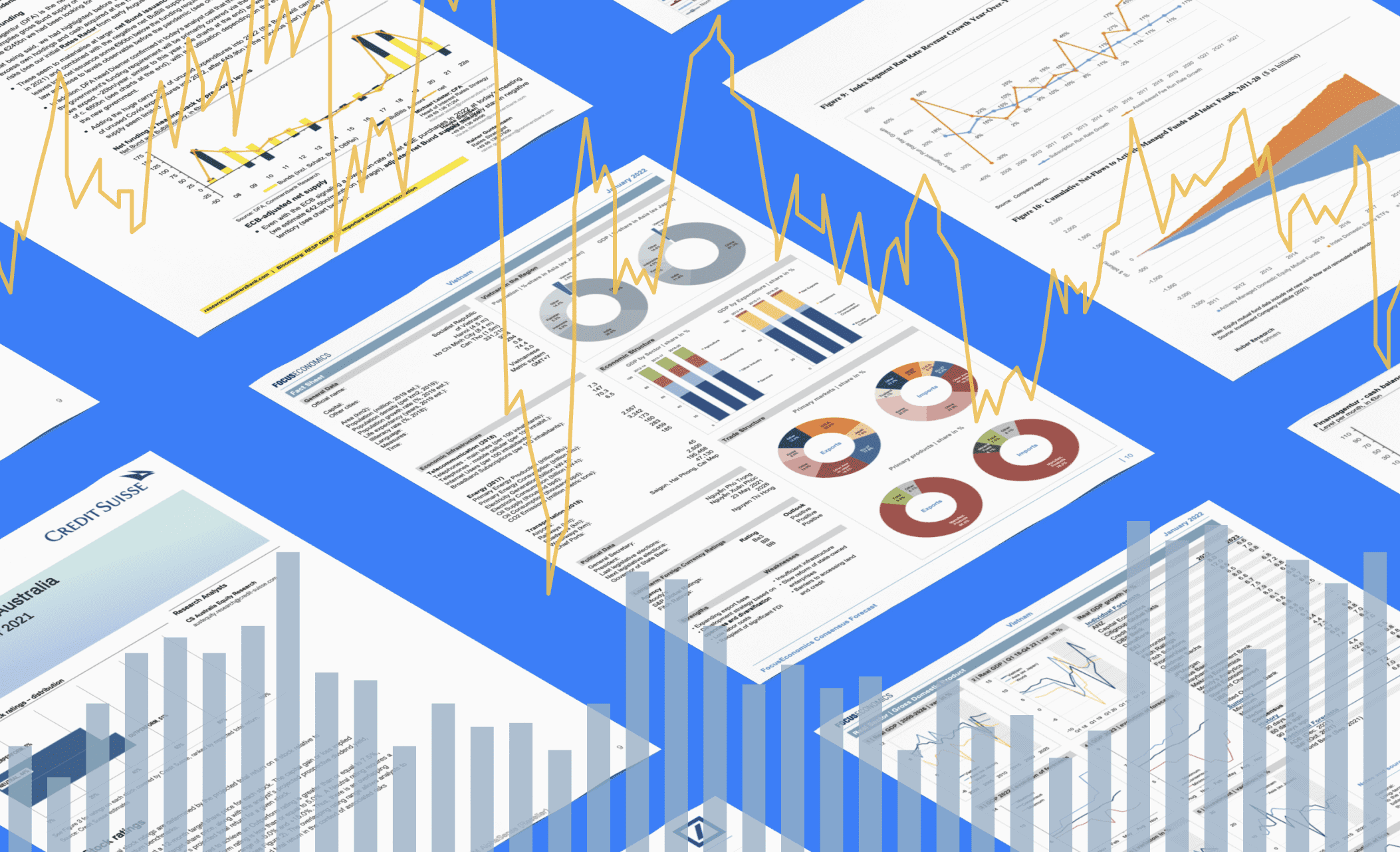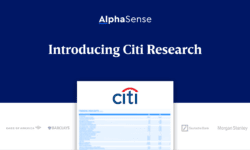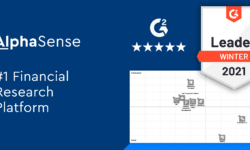As one of the four main resources for market intelligence, broker research possesses a priceless value for every job function within an organization, from C-Suite leadership to global supply chain partners. Since it’s produced by thousands of analysts worldwide, broker research provides valuable information on companies, industries, and market trends—especially useful in times of market uncertainty.
Considering the current macroeconomic landscape (i.e., supply chains playing catchup post-COVID-19, international tensions like the China-Taiwan conflict and Russian-Ukraine war, rising inflation, etc.), there’s no shortage of concern amongst executives on what future quarters hold for fiscal performance.
Within the AlphaSense platform, we boast an expansive collection of broker research with our Wall Street Insights® feature. By aggregating insights from leading banks, including Morgan Stanley, J.P. Morgan, Bank of America, Barclays, and exclusive partnerships with Citi and Goldman Sachs, we have a firm grasp on the market-moving trends set to impact the second half of 2023.
Below, we share the major trends that leading broker firms believe will impact the next few quarters, ranging from increasing adoption of cybersecurity to the role cryptocurrency will play in a post-FTX world.
Authentic ESG Labeling and Sustainability Initiatives
There’s no denying that investors, shareholders, and the like are becoming increasingly conscious of climate change and how the companies they invest in contribute to it. Now more than ever, authentic programs and initiatives founded in prioritizing the environmental, social, and governance impact of supply chains prove to be one of the best ways to win capital in a competitive marketplace.
Why? Recent investigations into major financial institutions have led to a growing demand for vetting processes of companies ascribing ESG to their policies. And while the SEC and ISSB‘s involvement has brought more authoritative figures into this issue, investors are still primarily responsible for determining whether a company or ESG fund is honest in its intentions.
Without an official system to check an organization’s commitment to its ESG policies, many shareholders and investors are doing their due diligence through fact-checking. From reviewing how a company is publicly rated as “ESG-friendly” to the supply chains they use and even the processes regulators utilize, there’s a myriad of aspects investors are analyzing to improve their responsible investing criteria.
The bottom line: broker research found within the AlphaSense platform forecasts ESG assets to generate $53 trillion in valuation by 2025. With new regulations emerging to target ESG risks like greenwashing, and the importance of performing ongoing due diligence on new developments within the space, ESG is no longer a nice to have. It is now a necessary piece of criteria that both investors and consumers are incorporating into their purchasing decisions.
Increasing Adoption of Cybersecurity
As broker research within the platforms reminds us: cyberattacks detrimentally impact the performance of enterprises around the world. As organizations invest more in cybersecurity to avoid attacks, research about the costs and consequences are emerging.
Cybersecurity Ventures expects global cybercrime costs to reaching an astounding $10.5 trillion annually by 2025:
“This [value] represents the greatest transfer of economic wealth in history, risks the incentives for innovation and investment, is exponentially larger than the damage inflicted from natural disasters in a year, and will be more profitable than the global trade of all major illegal drugs combined,” wrote Cybercrime Magazine’s editor-in-chief, Steve Morgan.
Further, Geopolitical fragmentation is increasingly affecting data protection and cybersecurity, especially when it comes to how businesses operate, as well as the countries they invest in. From the Russia-Ukraine war to the China-Taiwan conflict, there’s certainly no shortage of international tensions brewing.
And it’s bound to impact the U.S., according to a World Economic Forum (WEF) study. 93% of cyber leaders and 86% of business leaders think it is “moderately likely” or “very likely” that global geopolitical instability will lead to a far-reaching, catastrophic cyber event in the next two years.
But how do these international cyber threats translate for U.S. enterprises? WEF reports that 43% of organizational leaders believe a cyberattack will materially affect their own organization by 2025. Most leadership sees an organization’s cybersecurity risk as being influenced by the quality of security across its supply chain of commercial partners and clients.
Growing Cloud Computing Usage
The cloud computing market landscape has rapidly evolved in the past decade, driving competition among Wall Street investors and tech mammoths alike. In the age of digital transformation, almost every aspect of business seems to rely on cloud computing technology—the on-demand availability of computer system resources, especially data storage and computing power, without direct active management by a user.
Broker research within AlphaSense suggests there’s no slowing of hype around “the cloud.” According to Gartner, enterprise IT spending on public computing, within addressable market segments, will overtake spending on traditional IT in 2025. By 2025, 51% of IT spending will encompass the application software, infrastructure software, business process services, and system infrastructure markets, up nearly 10% from 2022.
More than half (76%) of organizations have adopted a multi-cloud strategy—a percentage expected to increase to 86% by 2024. Larger organizations are more likely to adopt a multi-cloud strategy. 94% of large enterprises (5,000+ employees) use multi-cloud infrastructure. This is mainly because large enterprises do better with this system (64% of large enterprises say multi-cloud is successful).
Broker research, in particular, points towards enterprise business as a major opportunity for both the IT services and software industries to invest in cloud-based technology. Many analysts are noting that an increasing number of businesses and individuals are prioritizing a transition to cloud solutions regarding strategic and budgetary importance within the next five years.
Cryptocurrency in a Post-FTX World
Is cryptocurrency a penniless opportunity? Not exactly. It has largely recovered from its lows, even when FTX’s fallout caused international distrust in the industry. Even though the macroeconomic environment is filled with uncertainty, it is different this time, with a possible recessionary slowdown. And even with allegations of fraud and crackdowns by regulators on crypto exchanges, many see room for growth.
In fact, some say the industry could experience frontier-tech-like maturation, especially in our quickly-developing tech landscape—less than 5% of total internet users interact with crypto. While the crypto market has been on a roller coaster in the past few years, with prices rising and falling quickly, broker research shares an optimistic forecast for virtual currencies. As more companies adopt blockchain technology, skilled professionals will be needed to work in the sector which will, in turn, create more job opportunities and foster further industry growth.
Major firms are also getting involved in the space: BlackRock filed an application with the SEC to launch a Bitcoin spot ETF. Further, the SEC has approved several futures-based crypto ETFs. Just days after BlackRock filed its new application, WisdomTree and Invesco both refiled applications for their own Bitcoin spot ETFs. Crypto exchange EDX Markets officially launched its platform, supporting trading of Bitcoin, Ethereum, Litecoin (LTC) and Bitcoin Cash.
Generative AI Integration in Healthcare
Tech mammoths are set on integrating generative AI (geniAI) into healthcare. From streamlining medical processes like scribing prescriptions to responding to patient messages, the list of potential use cases is endless.
According to a new report from Accenture, advances in large language AI models (which genAI uses) can revolutionize the healthcare industry, benefiting creativity and boosting productivity for providers and patients. Nearly all (98%) healthcare providers and (89%) healthcare payer executives who participated in the study believe these advancements will usher in enterprise intelligence, as 40% of all working hours could be supported or augmented by language-based AI.
Medical institutions face scarce clinical resources, which is why the biggest potential for generative AI in healthcare is to free overworked and underpaid employees from administrative tasks so they can work at the top of their license. “A strong digital core and investments in people will be the key to reaping the full value of generative AI in a responsible and authentic way,” Accenture writes.
But the work of integrating genAI into healthcare starts with helping both clinicians and patients stay up-to-date with this technology for greater access, better experiences, and improved outcomes. Further, institutions will need to get their proprietary data ready. Foundation models for genAI need vast amounts of curated data to learn, which means organizations need to take a strategic and disciplined approach to acquiring, vetting, safeguarding, and deploying data.
Broker Research in AlphaSense
Increasingly, professionals are embracing market intelligence platforms to find the insights they need faster. AlphaSense sets itself apart from the competition by providing access to over 10,000 business-grade sources, including a rich collection of premium equity research—as well as AI capabilities that expedite and enhance your research.
Without the context broker research provides to industry trends and market movements, your decision-making and strategy are susceptible to misinformation and fall short of driving results. You need a market intelligence platform that not only provides access to a premium collection of broker research but helps you separate the crucial insights from the noise.
Download our infosheet, Critical Areas Missing from Your Research: Wall Street Insights® (WSI), and discover how AlphaSense can help you leverage insights found within exclusive broker research to seize opportunities in unpredictable times.



